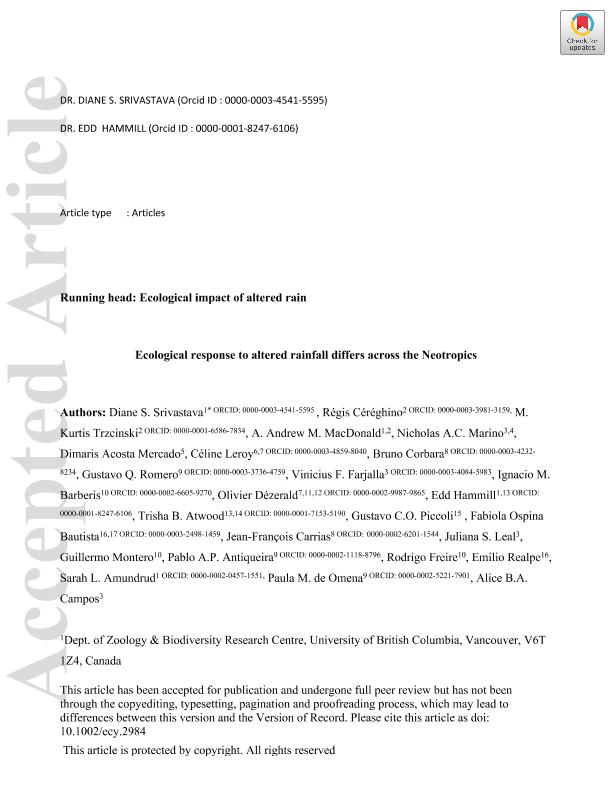Artículo
Ecological response to altered rainfall differs across the Neotropics
Srivastava, Diane S.; Céréghino, Régis; Trzcinski, M. Kurtis; MacDonald, A. Andrew M.; Marino, Nicholas A. C.; Mercado, Dimaris Acosta; Leroy, Céline; Corbara, Bruno; Romero, Gustavo Q.; Farjalla, Vinicius F.; Barberis, Ignacio Martín ; Dézerald, Olivier; Hammill, Edd; Atwood, Trisha B.; Piccoli, Gustavo C. O.; Ospina Bautista, Fabiola; Carrias, Jean François; Leal, Juliana S.; Montero, Guillermo Alberto; Antiqueira, Pablo A. P.; Freire, Rodrigo Manuel
; Dézerald, Olivier; Hammill, Edd; Atwood, Trisha B.; Piccoli, Gustavo C. O.; Ospina Bautista, Fabiola; Carrias, Jean François; Leal, Juliana S.; Montero, Guillermo Alberto; Antiqueira, Pablo A. P.; Freire, Rodrigo Manuel ; Realpe, Emilio; Amundrud, Sarah L.; Omena, Paula M.; Campos, Alice B. A.
; Realpe, Emilio; Amundrud, Sarah L.; Omena, Paula M.; Campos, Alice B. A.
 ; Dézerald, Olivier; Hammill, Edd; Atwood, Trisha B.; Piccoli, Gustavo C. O.; Ospina Bautista, Fabiola; Carrias, Jean François; Leal, Juliana S.; Montero, Guillermo Alberto; Antiqueira, Pablo A. P.; Freire, Rodrigo Manuel
; Dézerald, Olivier; Hammill, Edd; Atwood, Trisha B.; Piccoli, Gustavo C. O.; Ospina Bautista, Fabiola; Carrias, Jean François; Leal, Juliana S.; Montero, Guillermo Alberto; Antiqueira, Pablo A. P.; Freire, Rodrigo Manuel ; Realpe, Emilio; Amundrud, Sarah L.; Omena, Paula M.; Campos, Alice B. A.
; Realpe, Emilio; Amundrud, Sarah L.; Omena, Paula M.; Campos, Alice B. A.
Fecha de publicación:
02/2020
Editorial:
Ecological Society of America
Revista:
Ecology
ISSN:
0012-9658
Idioma:
Inglés
Tipo de recurso:
Artículo publicado
Clasificación temática:
Resumen
There is growing recognition that ecosystems may be more impacted by infrequent extreme climatic events than by changes in mean climatic conditions. This has led to calls for experiments that explore the sensitivity of ecosystems over broad ranges of climatic parameter space. However, because such response surface experiments have so far been limited in geographic and biological scope, it is not clear if differences between studies reflect geographic location or the ecosystem component considered. In this study, we manipulated rainfall entering tank bromeliads in seven sites across the Neotropics, and characterized the response of the aquatic ecosystem in terms of invertebrate functional composition, biological stocks (total invertebrate biomass, bacterial density) and ecosystem fluxes (decomposition, carbon, nitrogen). Of these response types, invertebrate functional composition was the most sensitive, even though, in some sites, the species pool had a high proportion of drought-tolerant families. Total invertebrate biomass was universally insensitive to rainfall change because of statistical averaging of divergent responses between functional groups. The response of invertebrate functional composition to rain differed between geographical locations because (1) the effect of rainfall on bromeliad hydrology differed between sites, and invertebrates directly experience hydrology not rainfall and (2) the taxonomic composition of some functional groups differed between sites, and families differed in their response to bromeliad hydrology. These findings suggest that it will be difficult to establish thresholds of “safe ecosystem functioning” when ecosystem components differ in their sensitivity to climatic variables, and such thresholds may not be broadly applicable over geographic space. In particular, ecological forecast horizons for climate change may be spatially restricted in systems where habitat properties mediate climatic impacts, and those, like the tropics, with high spatial turnover in species composition.
Archivos asociados
Licencia
Identificadores
Colecciones
Articulos(IICAR)
Articulos de INST. DE INVESTIGACIONES EN CIENCIAS AGRARIAS DE ROSARIO
Articulos de INST. DE INVESTIGACIONES EN CIENCIAS AGRARIAS DE ROSARIO
Citación
Srivastava, Diane S.; Céréghino, Régis; Trzcinski, M. Kurtis; MacDonald, A. Andrew M.; Marino, Nicholas A. C.; et al.; Ecological response to altered rainfall differs across the Neotropics; Ecological Society of America; Ecology; 101; 4; 2-2020; 1-43
Compartir
Altmétricas



